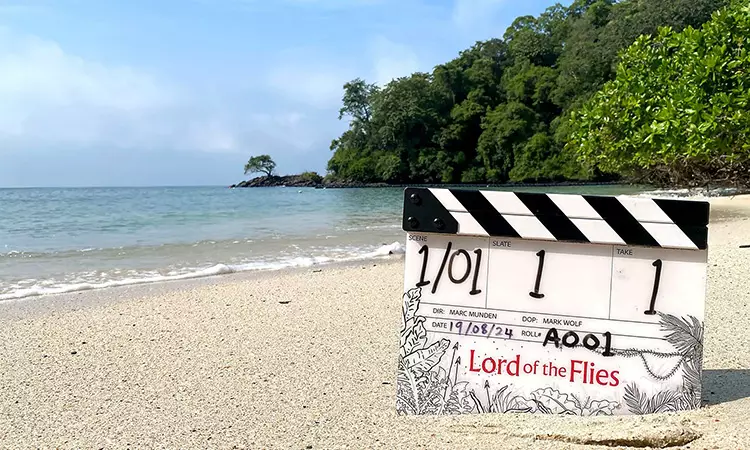The world has long been captivated by William Golding’s “Lord of the Flies,” a novel that dissects the fragile veneer of civilization through the chaotic descent of boys stranded on an uninhabited island. The BBC’s upcoming television adaptation has sparked considerable excitement among fans and newcomers alike. Spearheaded by Jack Thorne, famous for his work on “His Dark Materials,” and directed by the talented Marc Munden, this adaptation promises to reinvigorate this timeless story with a new visual and emotional depth.
The premise of the novel remains intact—the story unfolds as a group of schoolboys finds themselves isolated following a plane crash. Initially, they endeavor to maintain order, led by Ralph and Piggy, but the intrinsic human struggle surfaces as Jack’s predatory instincts threaten their collective stability. By setting the series in the early 1950s, Thorne aims to preserve the novel’s historical context while exploring its complex themes of innocence lost, class struggle, and the essence of masculinity.
Casting plays a crucial role in breathing life into Golding’s characters, and the BBC seems to have assembled a particularly gifted ensemble. David McKenna brings Piggy to life, while Winston Sawyers embodies Ralph, Lox Pratt adopts the feral persona of Jack, and Ike Talbut portrays the sensitive Simon. These actors, along with an impressive cast of over twenty other boys, are set to portray the nuances of childhood under extreme duress.
This diverse array of talent not only highlights the various character attributes present in Golding’s narrative but also signifies a commitment to authenticity. Jack Thorne’s declaration that the adaptation will remain ‘truthful’ to the original novel raises expectations regarding emotional resonance and multifaceted storytelling. The BBC aims to capture the raw vulnerability of youth amidst chaos, and the casting choices reflect this ambition.
The adaptation will consist of four episodes, each named after a key character—Ralph, Piggy, Simon, and Jack. This structure indicates a thoughtful approach to narrative development, suggesting that viewers will be able to experience the events through the distinctive lenses of each character. This technique not only enhances character depth but also invites the audience to empathize with the individual struggles each boy faces as the societal structure erodes.
Moreover, Thorne’s intention to explore emotive themes such as human nature and the loss of innocence speaks to a broader relevance in today’s world. In an era where discussions around masculinity and the impact of toxic behaviors are prevalent, this adaptation aims to shine a light on these important dialogues, fostering a deeper understanding of the characters’ motivations and actions.
Marc Munden’s comments on the creative process affirm a sense of excitement and originality. Munden has stated that he and Thorne are striving for a “whole new visual language” to represent both the wonders and tumult of the story. Collaborating with multi-Oscar winning composer Hans Zimmer and Emmy-nominated Kara Talve underscores the commitment to an immersive viewing experience. The musical score will likely enhance the emotional undertones of the series, elevating the narrative and connecting viewers to the boys’ plight on a visceral level.
Golding’s family has expressed their support for the adaptation, reaffirming that the thematic core of the story is being upheld. The involvement of the author’s family suggests a deep respect for the source material and an intention to honor Golding’s nuanced portrayal of societal breakdown.
As filming unfolds in Malaysia and the UK, there is a palpable sense of anticipation surrounding the series. The challenge of translating a literary classic to the screen is immense, yet the collaborative vision of Thorne, Munden, and their talented cast suggests a promising outcome. This adaptation may not only introduce Golding’s work to a new generation but also encourage discussions about the themes that crowd each frame. With the unique perspective each episode promises to explore, the BBC’s adaptation of “Lord of the Flies” could redefine how audiences perceive and understand the complexities of human nature.

